Evaluation of Managerial Skills and Ethical Decision-Making Report
VerifiedAdded on 2021/06/15
|25
|3929
|32
Report
AI Summary
This report delves into the critical importance of ethical decision-making within managerial practices. It begins by establishing the significance of ethics in business, questioning whether an immoral person can make ethical decisions and exploring how ethics can be incorporated into decision-making processes. The report then reviews literature on conflict management, ethical considerations, and personality traits in relation to ethical decision-making. The evaluation section assesses the author's managerial capabilities using the Thomas-Kilmann Conflict Mode Instrument and Belbin Self-Perception Inventory, identifying areas for skill development, particularly in conflict management and ethical leadership. The report concludes with a strategic plan for enhancing these skills, emphasizing the need for emotional intelligence and a combination of reflective and theorist styles for effective ethical leadership.
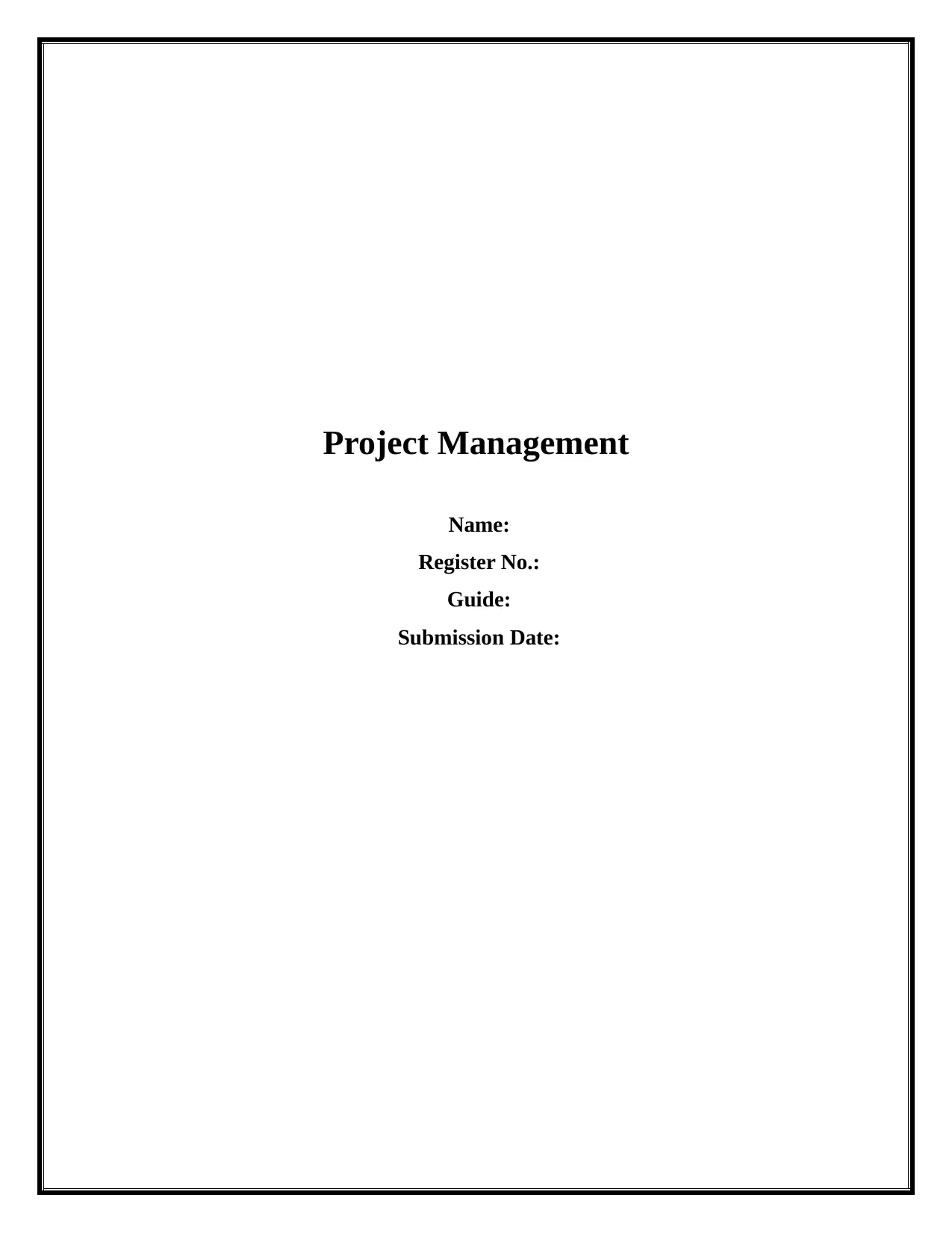
Project Management
Name:
Register No.:
Guide:
Submission Date:
Name:
Register No.:
Guide:
Submission Date:
Paraphrase This Document
Need a fresh take? Get an instant paraphrase of this document with our AI Paraphraser
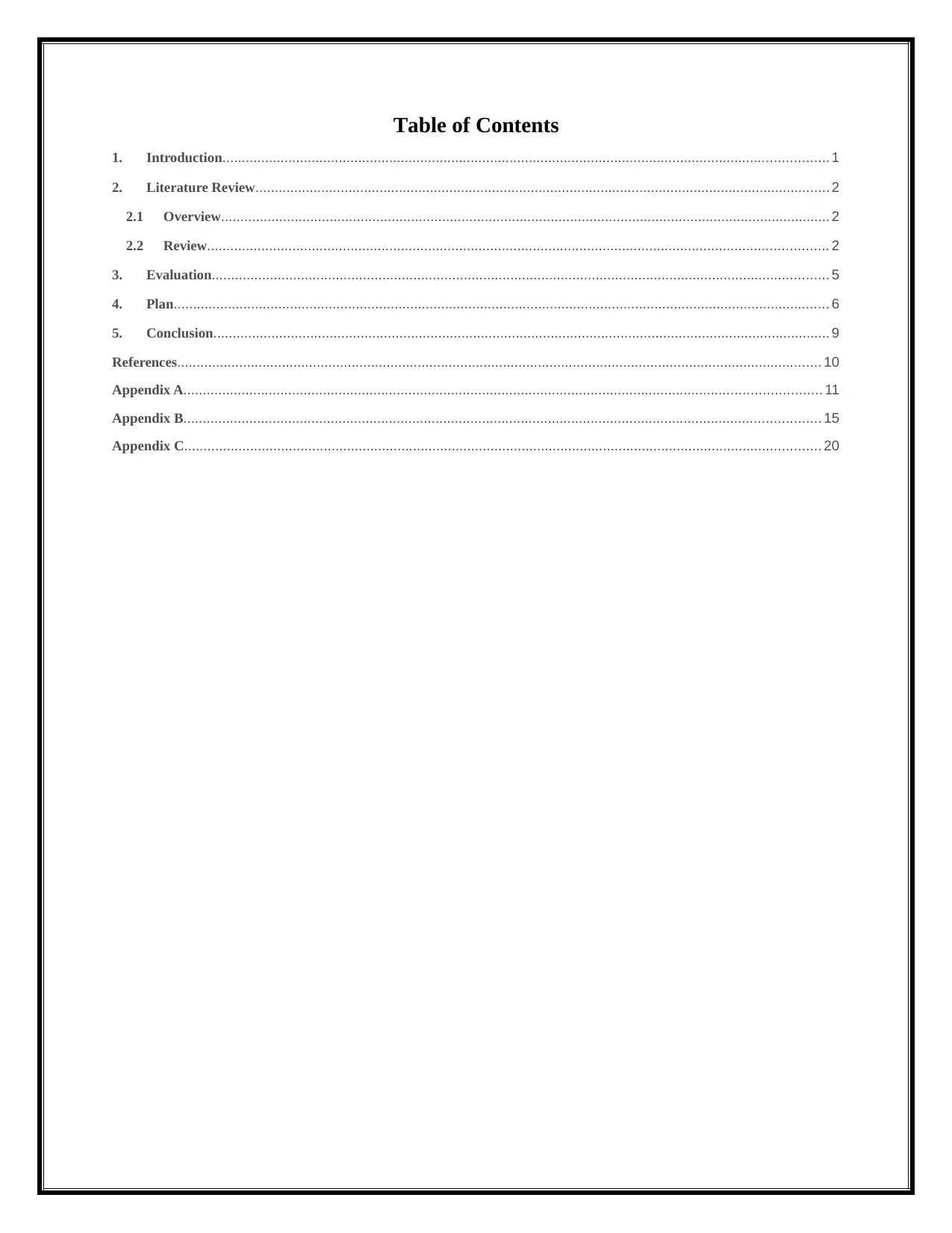
Table of Contents
1. Introduction............................................................................................................................................................ 1
2. Literature Review.................................................................................................................................................... 2
2.1 Overview............................................................................................................................................................. 2
2.2 Review................................................................................................................................................................ 2
3. Evaluation............................................................................................................................................................... 5
4. Plan......................................................................................................................................................................... 6
5. Conclusion............................................................................................................................................................... 9
References...................................................................................................................................................................... 10
Appendix A.................................................................................................................................................................... 11
Appendix B.................................................................................................................................................................... 15
Appendix C.................................................................................................................................................................... 20
1. Introduction............................................................................................................................................................ 1
2. Literature Review.................................................................................................................................................... 2
2.1 Overview............................................................................................................................................................. 2
2.2 Review................................................................................................................................................................ 2
3. Evaluation............................................................................................................................................................... 5
4. Plan......................................................................................................................................................................... 6
5. Conclusion............................................................................................................................................................... 9
References...................................................................................................................................................................... 10
Appendix A.................................................................................................................................................................... 11
Appendix B.................................................................................................................................................................... 15
Appendix C.................................................................................................................................................................... 20
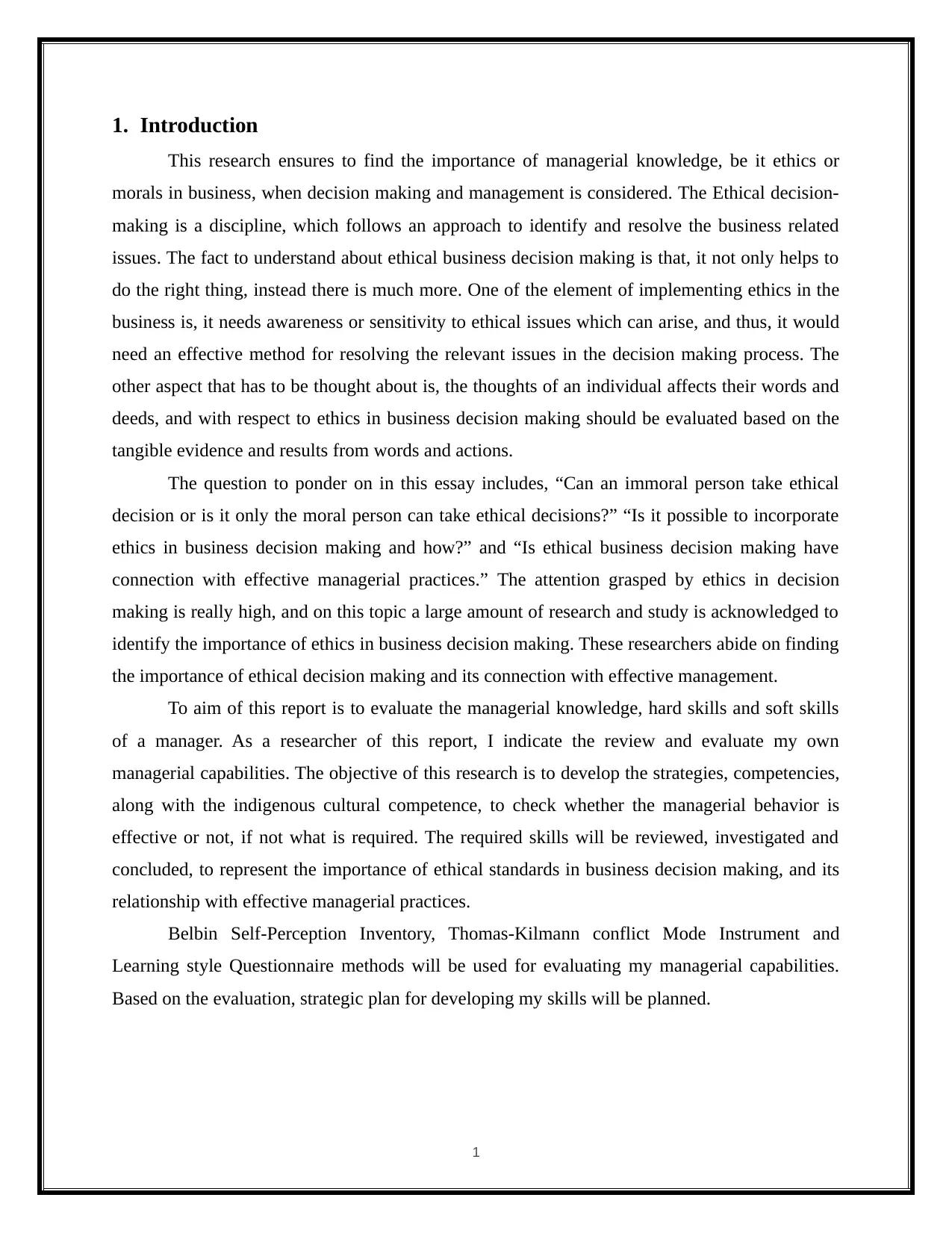
1. Introduction
This research ensures to find the importance of managerial knowledge, be it ethics or
morals in business, when decision making and management is considered. The Ethical decision-
making is a discipline, which follows an approach to identify and resolve the business related
issues. The fact to understand about ethical business decision making is that, it not only helps to
do the right thing, instead there is much more. One of the element of implementing ethics in the
business is, it needs awareness or sensitivity to ethical issues which can arise, and thus, it would
need an effective method for resolving the relevant issues in the decision making process. The
other aspect that has to be thought about is, the thoughts of an individual affects their words and
deeds, and with respect to ethics in business decision making should be evaluated based on the
tangible evidence and results from words and actions.
The question to ponder on in this essay includes, “Can an immoral person take ethical
decision or is it only the moral person can take ethical decisions?” “Is it possible to incorporate
ethics in business decision making and how?” and “Is ethical business decision making have
connection with effective managerial practices.” The attention grasped by ethics in decision
making is really high, and on this topic a large amount of research and study is acknowledged to
identify the importance of ethics in business decision making. These researchers abide on finding
the importance of ethical decision making and its connection with effective management.
To aim of this report is to evaluate the managerial knowledge, hard skills and soft skills
of a manager. As a researcher of this report, I indicate the review and evaluate my own
managerial capabilities. The objective of this research is to develop the strategies, competencies,
along with the indigenous cultural competence, to check whether the managerial behavior is
effective or not, if not what is required. The required skills will be reviewed, investigated and
concluded, to represent the importance of ethical standards in business decision making, and its
relationship with effective managerial practices.
Belbin Self-Perception Inventory, Thomas-Kilmann conflict Mode Instrument and
Learning style Questionnaire methods will be used for evaluating my managerial capabilities.
Based on the evaluation, strategic plan for developing my skills will be planned.
1
This research ensures to find the importance of managerial knowledge, be it ethics or
morals in business, when decision making and management is considered. The Ethical decision-
making is a discipline, which follows an approach to identify and resolve the business related
issues. The fact to understand about ethical business decision making is that, it not only helps to
do the right thing, instead there is much more. One of the element of implementing ethics in the
business is, it needs awareness or sensitivity to ethical issues which can arise, and thus, it would
need an effective method for resolving the relevant issues in the decision making process. The
other aspect that has to be thought about is, the thoughts of an individual affects their words and
deeds, and with respect to ethics in business decision making should be evaluated based on the
tangible evidence and results from words and actions.
The question to ponder on in this essay includes, “Can an immoral person take ethical
decision or is it only the moral person can take ethical decisions?” “Is it possible to incorporate
ethics in business decision making and how?” and “Is ethical business decision making have
connection with effective managerial practices.” The attention grasped by ethics in decision
making is really high, and on this topic a large amount of research and study is acknowledged to
identify the importance of ethics in business decision making. These researchers abide on finding
the importance of ethical decision making and its connection with effective management.
To aim of this report is to evaluate the managerial knowledge, hard skills and soft skills
of a manager. As a researcher of this report, I indicate the review and evaluate my own
managerial capabilities. The objective of this research is to develop the strategies, competencies,
along with the indigenous cultural competence, to check whether the managerial behavior is
effective or not, if not what is required. The required skills will be reviewed, investigated and
concluded, to represent the importance of ethical standards in business decision making, and its
relationship with effective managerial practices.
Belbin Self-Perception Inventory, Thomas-Kilmann conflict Mode Instrument and
Learning style Questionnaire methods will be used for evaluating my managerial capabilities.
Based on the evaluation, strategic plan for developing my skills will be planned.
1
⊘ This is a preview!⊘
Do you want full access?
Subscribe today to unlock all pages.

Trusted by 1+ million students worldwide
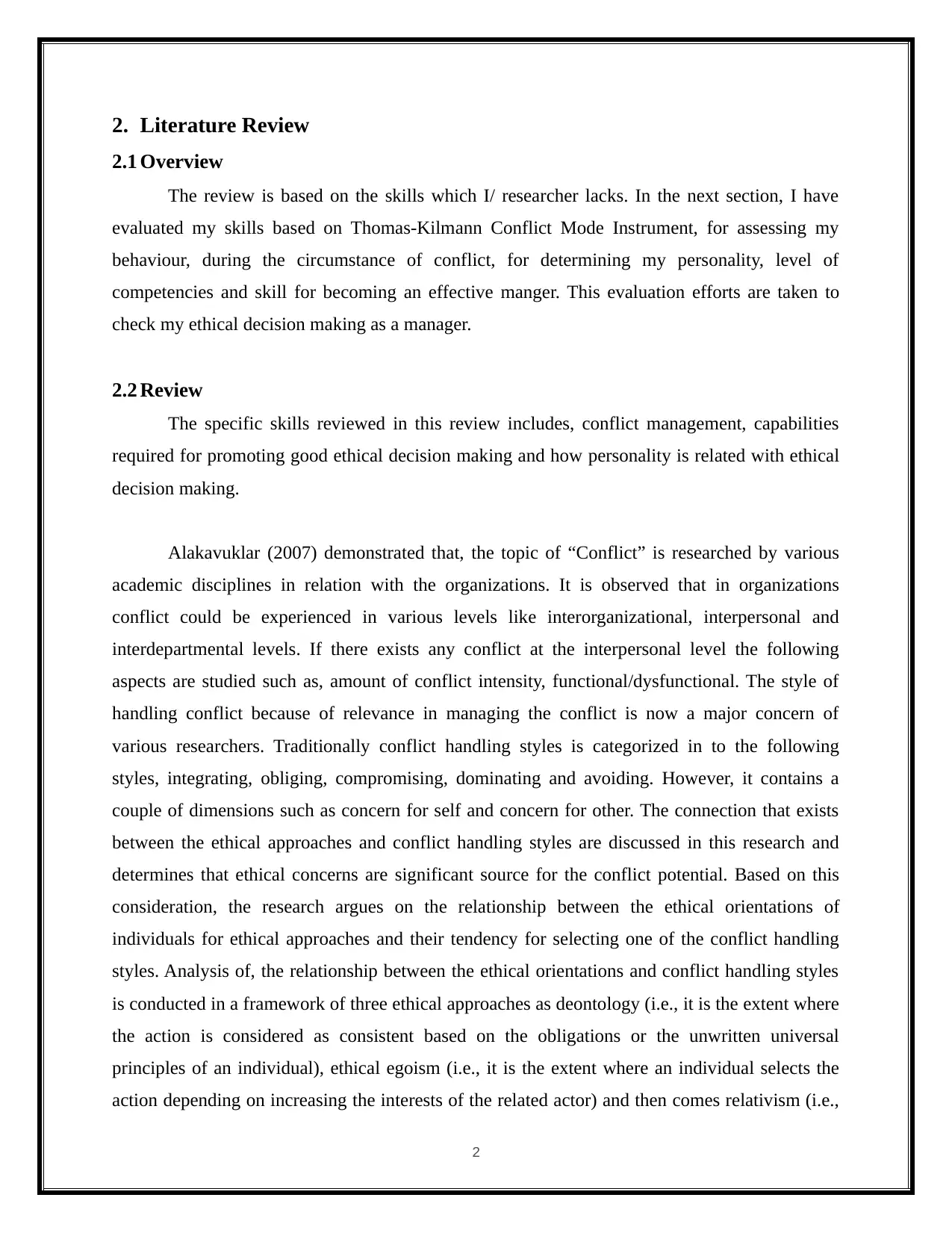
2. Literature Review
2.1 Overview
The review is based on the skills which I/ researcher lacks. In the next section, I have
evaluated my skills based on Thomas-Kilmann Conflict Mode Instrument, for assessing my
behaviour, during the circumstance of conflict, for determining my personality, level of
competencies and skill for becoming an effective manger. This evaluation efforts are taken to
check my ethical decision making as a manager.
2.2 Review
The specific skills reviewed in this review includes, conflict management, capabilities
required for promoting good ethical decision making and how personality is related with ethical
decision making.
Alakavuklar (2007) demonstrated that, the topic of “Conflict” is researched by various
academic disciplines in relation with the organizations. It is observed that in organizations
conflict could be experienced in various levels like interorganizational, interpersonal and
interdepartmental levels. If there exists any conflict at the interpersonal level the following
aspects are studied such as, amount of conflict intensity, functional/dysfunctional. The style of
handling conflict because of relevance in managing the conflict is now a major concern of
various researchers. Traditionally conflict handling styles is categorized in to the following
styles, integrating, obliging, compromising, dominating and avoiding. However, it contains a
couple of dimensions such as concern for self and concern for other. The connection that exists
between the ethical approaches and conflict handling styles are discussed in this research and
determines that ethical concerns are significant source for the conflict potential. Based on this
consideration, the research argues on the relationship between the ethical orientations of
individuals for ethical approaches and their tendency for selecting one of the conflict handling
styles. Analysis of, the relationship between the ethical orientations and conflict handling styles
is conducted in a framework of three ethical approaches as deontology (i.e., it is the extent where
the action is considered as consistent based on the obligations or the unwritten universal
principles of an individual), ethical egoism (i.e., it is the extent where an individual selects the
action depending on increasing the interests of the related actor) and then comes relativism (i.e.,
2
2.1 Overview
The review is based on the skills which I/ researcher lacks. In the next section, I have
evaluated my skills based on Thomas-Kilmann Conflict Mode Instrument, for assessing my
behaviour, during the circumstance of conflict, for determining my personality, level of
competencies and skill for becoming an effective manger. This evaluation efforts are taken to
check my ethical decision making as a manager.
2.2 Review
The specific skills reviewed in this review includes, conflict management, capabilities
required for promoting good ethical decision making and how personality is related with ethical
decision making.
Alakavuklar (2007) demonstrated that, the topic of “Conflict” is researched by various
academic disciplines in relation with the organizations. It is observed that in organizations
conflict could be experienced in various levels like interorganizational, interpersonal and
interdepartmental levels. If there exists any conflict at the interpersonal level the following
aspects are studied such as, amount of conflict intensity, functional/dysfunctional. The style of
handling conflict because of relevance in managing the conflict is now a major concern of
various researchers. Traditionally conflict handling styles is categorized in to the following
styles, integrating, obliging, compromising, dominating and avoiding. However, it contains a
couple of dimensions such as concern for self and concern for other. The connection that exists
between the ethical approaches and conflict handling styles are discussed in this research and
determines that ethical concerns are significant source for the conflict potential. Based on this
consideration, the research argues on the relationship between the ethical orientations of
individuals for ethical approaches and their tendency for selecting one of the conflict handling
styles. Analysis of, the relationship between the ethical orientations and conflict handling styles
is conducted in a framework of three ethical approaches as deontology (i.e., it is the extent where
the action is considered as consistent based on the obligations or the unwritten universal
principles of an individual), ethical egoism (i.e., it is the extent where an individual selects the
action depending on increasing the interests of the related actor) and then comes relativism (i.e.,
2
Paraphrase This Document
Need a fresh take? Get an instant paraphrase of this document with our AI Paraphraser
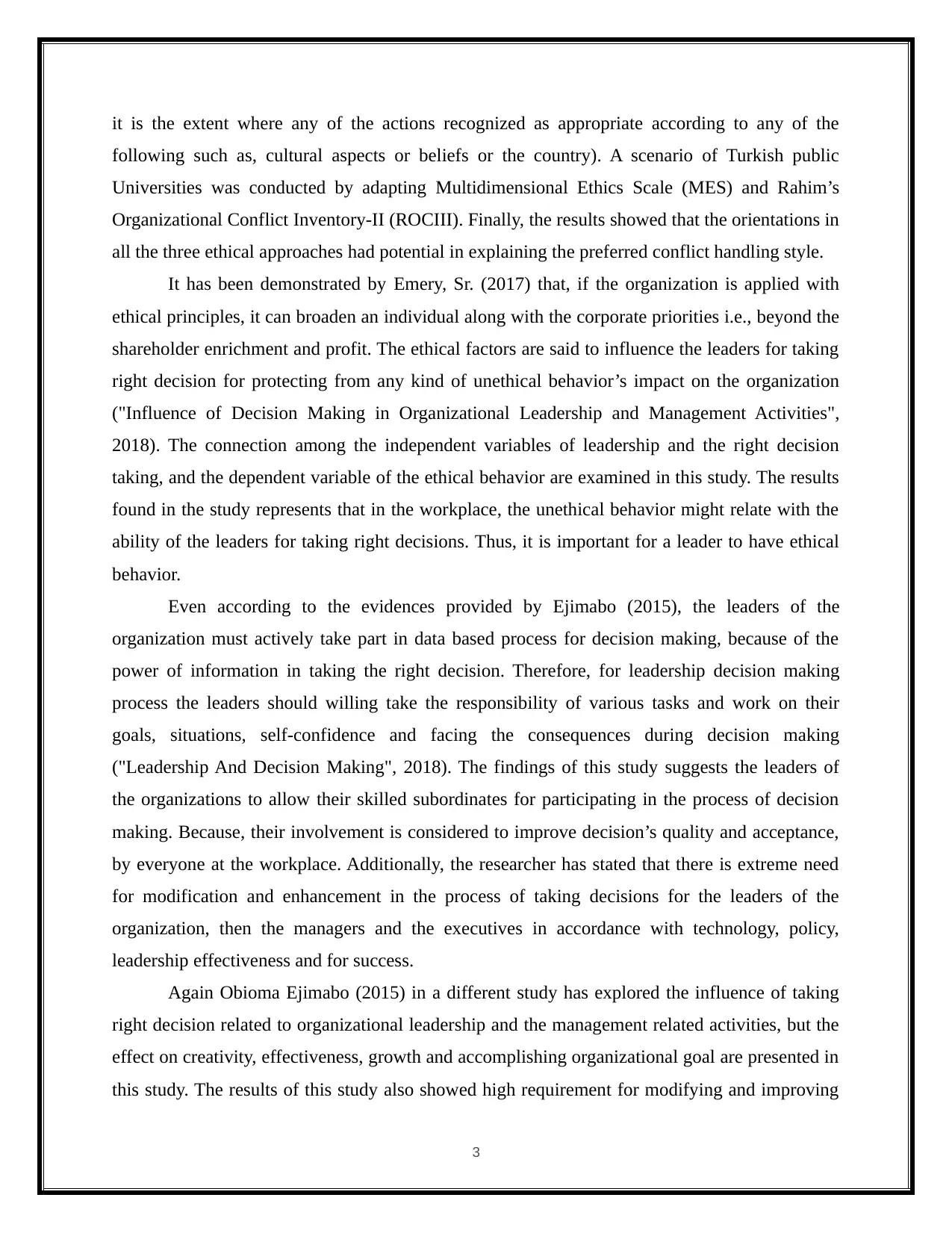
it is the extent where any of the actions recognized as appropriate according to any of the
following such as, cultural aspects or beliefs or the country). A scenario of Turkish public
Universities was conducted by adapting Multidimensional Ethics Scale (MES) and Rahim’s
Organizational Conflict Inventory-II (ROCIII). Finally, the results showed that the orientations in
all the three ethical approaches had potential in explaining the preferred conflict handling style.
It has been demonstrated by Emery, Sr. (2017) that, if the organization is applied with
ethical principles, it can broaden an individual along with the corporate priorities i.e., beyond the
shareholder enrichment and profit. The ethical factors are said to influence the leaders for taking
right decision for protecting from any kind of unethical behavior’s impact on the organization
("Influence of Decision Making in Organizational Leadership and Management Activities",
2018). The connection among the independent variables of leadership and the right decision
taking, and the dependent variable of the ethical behavior are examined in this study. The results
found in the study represents that in the workplace, the unethical behavior might relate with the
ability of the leaders for taking right decisions. Thus, it is important for a leader to have ethical
behavior.
Even according to the evidences provided by Ejimabo (2015), the leaders of the
organization must actively take part in data based process for decision making, because of the
power of information in taking the right decision. Therefore, for leadership decision making
process the leaders should willing take the responsibility of various tasks and work on their
goals, situations, self-confidence and facing the consequences during decision making
("Leadership And Decision Making", 2018). The findings of this study suggests the leaders of
the organizations to allow their skilled subordinates for participating in the process of decision
making. Because, their involvement is considered to improve decision’s quality and acceptance,
by everyone at the workplace. Additionally, the researcher has stated that there is extreme need
for modification and enhancement in the process of taking decisions for the leaders of the
organization, then the managers and the executives in accordance with technology, policy,
leadership effectiveness and for success.
Again Obioma Ejimabo (2015) in a different study has explored the influence of taking
right decision related to organizational leadership and the management related activities, but the
effect on creativity, effectiveness, growth and accomplishing organizational goal are presented in
this study. The results of this study also showed high requirement for modifying and improving
3
following such as, cultural aspects or beliefs or the country). A scenario of Turkish public
Universities was conducted by adapting Multidimensional Ethics Scale (MES) and Rahim’s
Organizational Conflict Inventory-II (ROCIII). Finally, the results showed that the orientations in
all the three ethical approaches had potential in explaining the preferred conflict handling style.
It has been demonstrated by Emery, Sr. (2017) that, if the organization is applied with
ethical principles, it can broaden an individual along with the corporate priorities i.e., beyond the
shareholder enrichment and profit. The ethical factors are said to influence the leaders for taking
right decision for protecting from any kind of unethical behavior’s impact on the organization
("Influence of Decision Making in Organizational Leadership and Management Activities",
2018). The connection among the independent variables of leadership and the right decision
taking, and the dependent variable of the ethical behavior are examined in this study. The results
found in the study represents that in the workplace, the unethical behavior might relate with the
ability of the leaders for taking right decisions. Thus, it is important for a leader to have ethical
behavior.
Even according to the evidences provided by Ejimabo (2015), the leaders of the
organization must actively take part in data based process for decision making, because of the
power of information in taking the right decision. Therefore, for leadership decision making
process the leaders should willing take the responsibility of various tasks and work on their
goals, situations, self-confidence and facing the consequences during decision making
("Leadership And Decision Making", 2018). The findings of this study suggests the leaders of
the organizations to allow their skilled subordinates for participating in the process of decision
making. Because, their involvement is considered to improve decision’s quality and acceptance,
by everyone at the workplace. Additionally, the researcher has stated that there is extreme need
for modification and enhancement in the process of taking decisions for the leaders of the
organization, then the managers and the executives in accordance with technology, policy,
leadership effectiveness and for success.
Again Obioma Ejimabo (2015) in a different study has explored the influence of taking
right decision related to organizational leadership and the management related activities, but the
effect on creativity, effectiveness, growth and accomplishing organizational goal are presented in
this study. The results of this study also showed high requirement for modifying and improving
3
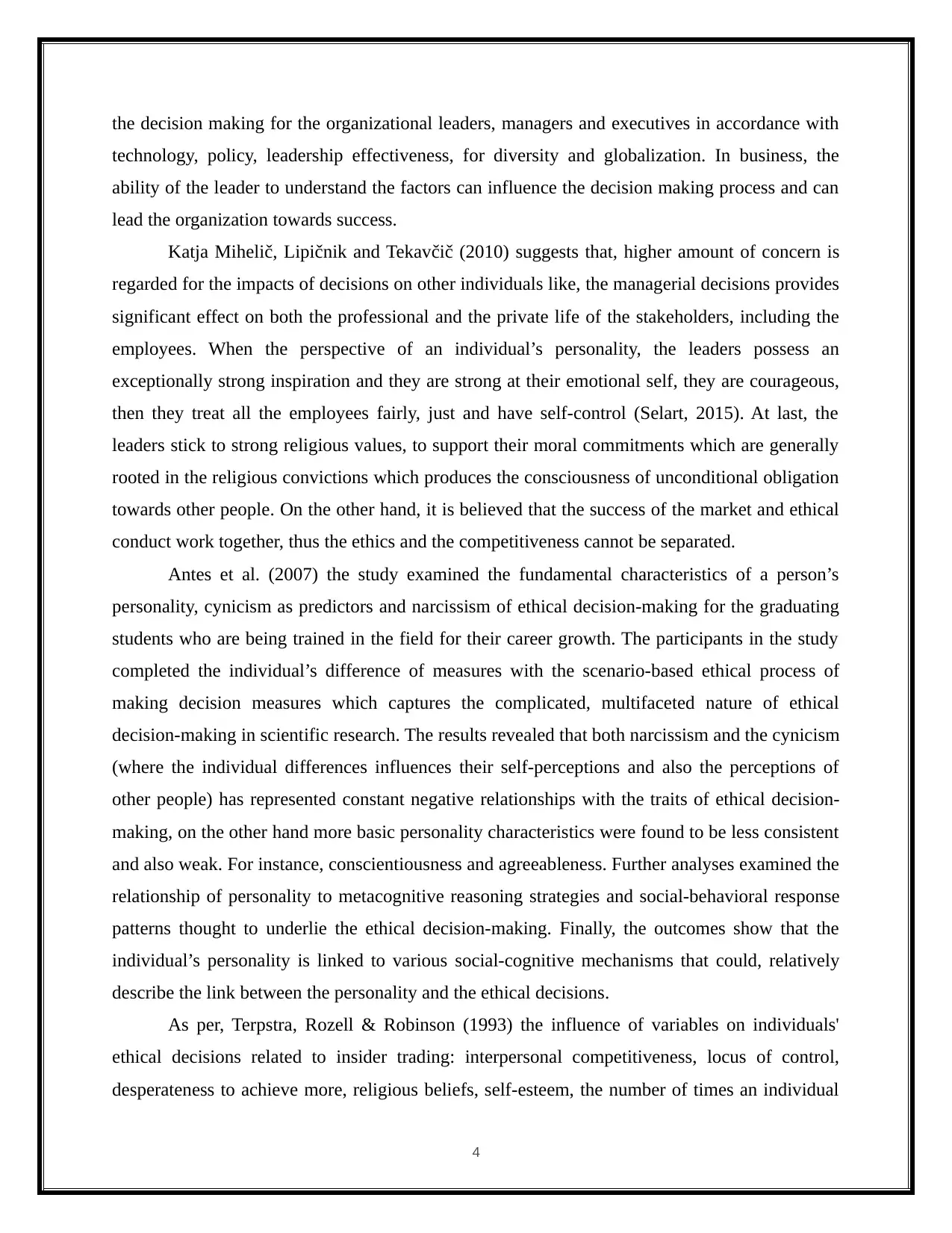
the decision making for the organizational leaders, managers and executives in accordance with
technology, policy, leadership effectiveness, for diversity and globalization. In business, the
ability of the leader to understand the factors can influence the decision making process and can
lead the organization towards success.
Katja Mihelič, Lipičnik and Tekavčič (2010) suggests that, higher amount of concern is
regarded for the impacts of decisions on other individuals like, the managerial decisions provides
significant effect on both the professional and the private life of the stakeholders, including the
employees. When the perspective of an individual’s personality, the leaders possess an
exceptionally strong inspiration and they are strong at their emotional self, they are courageous,
then they treat all the employees fairly, just and have self-control (Selart, 2015). At last, the
leaders stick to strong religious values, to support their moral commitments which are generally
rooted in the religious convictions which produces the consciousness of unconditional obligation
towards other people. On the other hand, it is believed that the success of the market and ethical
conduct work together, thus the ethics and the competitiveness cannot be separated.
Antes et al. (2007) the study examined the fundamental characteristics of a person’s
personality, cynicism as predictors and narcissism of ethical decision-making for the graduating
students who are being trained in the field for their career growth. The participants in the study
completed the individual’s difference of measures with the scenario-based ethical process of
making decision measures which captures the complicated, multifaceted nature of ethical
decision-making in scientific research. The results revealed that both narcissism and the cynicism
(where the individual differences influences their self-perceptions and also the perceptions of
other people) has represented constant negative relationships with the traits of ethical decision-
making, on the other hand more basic personality characteristics were found to be less consistent
and also weak. For instance, conscientiousness and agreeableness. Further analyses examined the
relationship of personality to metacognitive reasoning strategies and social-behavioral response
patterns thought to underlie the ethical decision-making. Finally, the outcomes show that the
individual’s personality is linked to various social-cognitive mechanisms that could, relatively
describe the link between the personality and the ethical decisions.
As per, Terpstra, Rozell & Robinson (1993) the influence of variables on individuals'
ethical decisions related to insider trading: interpersonal competitiveness, locus of control,
desperateness to achieve more, religious beliefs, self-esteem, the number of times an individual
4
technology, policy, leadership effectiveness, for diversity and globalization. In business, the
ability of the leader to understand the factors can influence the decision making process and can
lead the organization towards success.
Katja Mihelič, Lipičnik and Tekavčič (2010) suggests that, higher amount of concern is
regarded for the impacts of decisions on other individuals like, the managerial decisions provides
significant effect on both the professional and the private life of the stakeholders, including the
employees. When the perspective of an individual’s personality, the leaders possess an
exceptionally strong inspiration and they are strong at their emotional self, they are courageous,
then they treat all the employees fairly, just and have self-control (Selart, 2015). At last, the
leaders stick to strong religious values, to support their moral commitments which are generally
rooted in the religious convictions which produces the consciousness of unconditional obligation
towards other people. On the other hand, it is believed that the success of the market and ethical
conduct work together, thus the ethics and the competitiveness cannot be separated.
Antes et al. (2007) the study examined the fundamental characteristics of a person’s
personality, cynicism as predictors and narcissism of ethical decision-making for the graduating
students who are being trained in the field for their career growth. The participants in the study
completed the individual’s difference of measures with the scenario-based ethical process of
making decision measures which captures the complicated, multifaceted nature of ethical
decision-making in scientific research. The results revealed that both narcissism and the cynicism
(where the individual differences influences their self-perceptions and also the perceptions of
other people) has represented constant negative relationships with the traits of ethical decision-
making, on the other hand more basic personality characteristics were found to be less consistent
and also weak. For instance, conscientiousness and agreeableness. Further analyses examined the
relationship of personality to metacognitive reasoning strategies and social-behavioral response
patterns thought to underlie the ethical decision-making. Finally, the outcomes show that the
individual’s personality is linked to various social-cognitive mechanisms that could, relatively
describe the link between the personality and the ethical decisions.
As per, Terpstra, Rozell & Robinson (1993) the influence of variables on individuals'
ethical decisions related to insider trading: interpersonal competitiveness, locus of control,
desperateness to achieve more, religious beliefs, self-esteem, the number of times an individual
4
⊘ This is a preview!⊘
Do you want full access?
Subscribe today to unlock all pages.

Trusted by 1+ million students worldwide
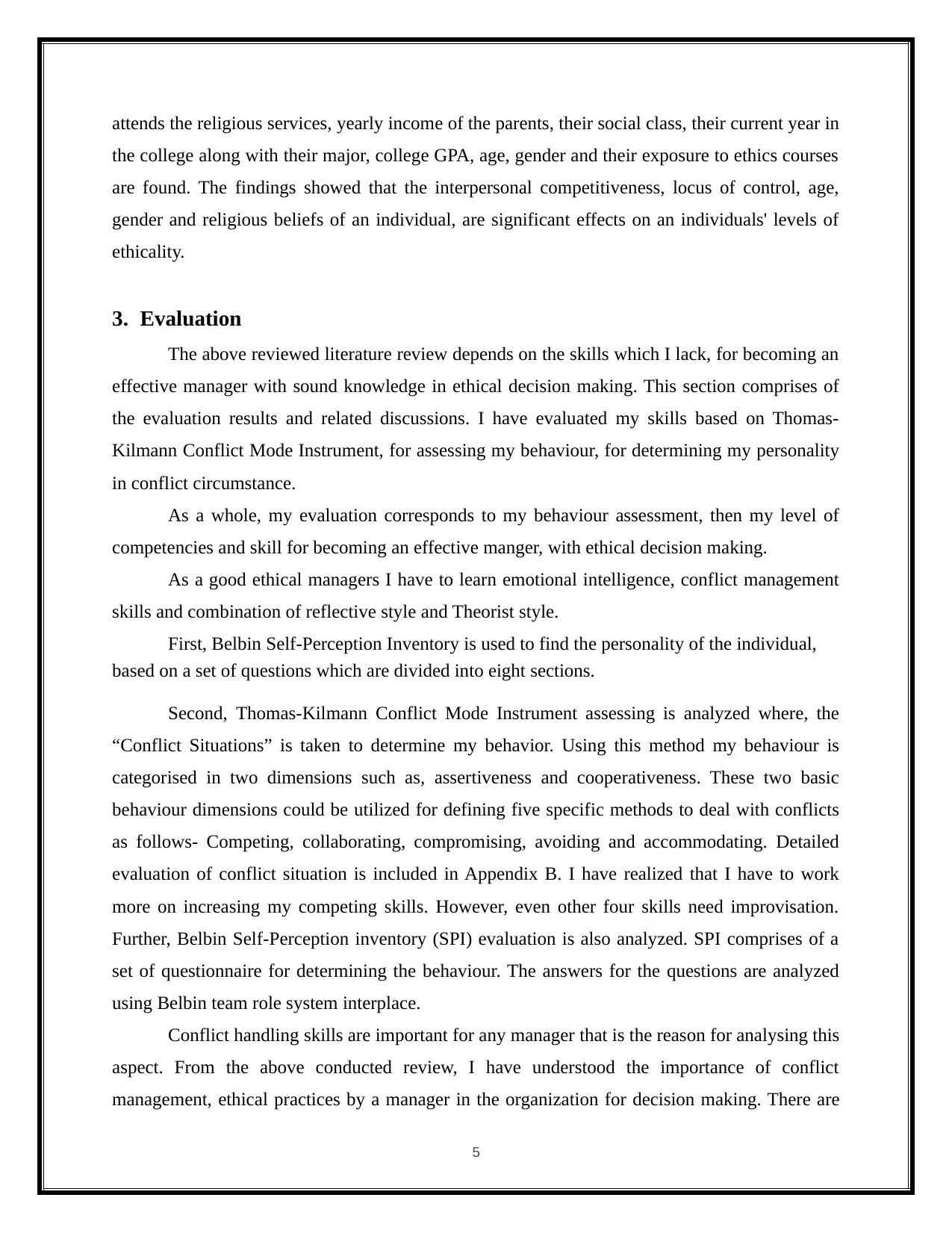
attends the religious services, yearly income of the parents, their social class, their current year in
the college along with their major, college GPA, age, gender and their exposure to ethics courses
are found. The findings showed that the interpersonal competitiveness, locus of control, age,
gender and religious beliefs of an individual, are significant effects on an individuals' levels of
ethicality.
3. Evaluation
The above reviewed literature review depends on the skills which I lack, for becoming an
effective manager with sound knowledge in ethical decision making. This section comprises of
the evaluation results and related discussions. I have evaluated my skills based on Thomas-
Kilmann Conflict Mode Instrument, for assessing my behaviour, for determining my personality
in conflict circumstance.
As a whole, my evaluation corresponds to my behaviour assessment, then my level of
competencies and skill for becoming an effective manger, with ethical decision making.
As a good ethical managers I have to learn emotional intelligence, conflict management
skills and combination of reflective style and Theorist style.
First, Belbin Self-Perception Inventory is used to find the personality of the individual,
based on a set of questions which are divided into eight sections.
Second, Thomas-Kilmann Conflict Mode Instrument assessing is analyzed where, the
“Conflict Situations” is taken to determine my behavior. Using this method my behaviour is
categorised in two dimensions such as, assertiveness and cooperativeness. These two basic
behaviour dimensions could be utilized for defining five specific methods to deal with conflicts
as follows- Competing, collaborating, compromising, avoiding and accommodating. Detailed
evaluation of conflict situation is included in Appendix B. I have realized that I have to work
more on increasing my competing skills. However, even other four skills need improvisation.
Further, Belbin Self-Perception inventory (SPI) evaluation is also analyzed. SPI comprises of a
set of questionnaire for determining the behaviour. The answers for the questions are analyzed
using Belbin team role system interplace.
Conflict handling skills are important for any manager that is the reason for analysing this
aspect. From the above conducted review, I have understood the importance of conflict
management, ethical practices by a manager in the organization for decision making. There are
5
the college along with their major, college GPA, age, gender and their exposure to ethics courses
are found. The findings showed that the interpersonal competitiveness, locus of control, age,
gender and religious beliefs of an individual, are significant effects on an individuals' levels of
ethicality.
3. Evaluation
The above reviewed literature review depends on the skills which I lack, for becoming an
effective manager with sound knowledge in ethical decision making. This section comprises of
the evaluation results and related discussions. I have evaluated my skills based on Thomas-
Kilmann Conflict Mode Instrument, for assessing my behaviour, for determining my personality
in conflict circumstance.
As a whole, my evaluation corresponds to my behaviour assessment, then my level of
competencies and skill for becoming an effective manger, with ethical decision making.
As a good ethical managers I have to learn emotional intelligence, conflict management
skills and combination of reflective style and Theorist style.
First, Belbin Self-Perception Inventory is used to find the personality of the individual,
based on a set of questions which are divided into eight sections.
Second, Thomas-Kilmann Conflict Mode Instrument assessing is analyzed where, the
“Conflict Situations” is taken to determine my behavior. Using this method my behaviour is
categorised in two dimensions such as, assertiveness and cooperativeness. These two basic
behaviour dimensions could be utilized for defining five specific methods to deal with conflicts
as follows- Competing, collaborating, compromising, avoiding and accommodating. Detailed
evaluation of conflict situation is included in Appendix B. I have realized that I have to work
more on increasing my competing skills. However, even other four skills need improvisation.
Further, Belbin Self-Perception inventory (SPI) evaluation is also analyzed. SPI comprises of a
set of questionnaire for determining the behaviour. The answers for the questions are analyzed
using Belbin team role system interplace.
Conflict handling skills are important for any manager that is the reason for analysing this
aspect. From the above conducted review, I have understood the importance of conflict
management, ethical practices by a manager in the organization for decision making. There are
5
Paraphrase This Document
Need a fresh take? Get an instant paraphrase of this document with our AI Paraphraser
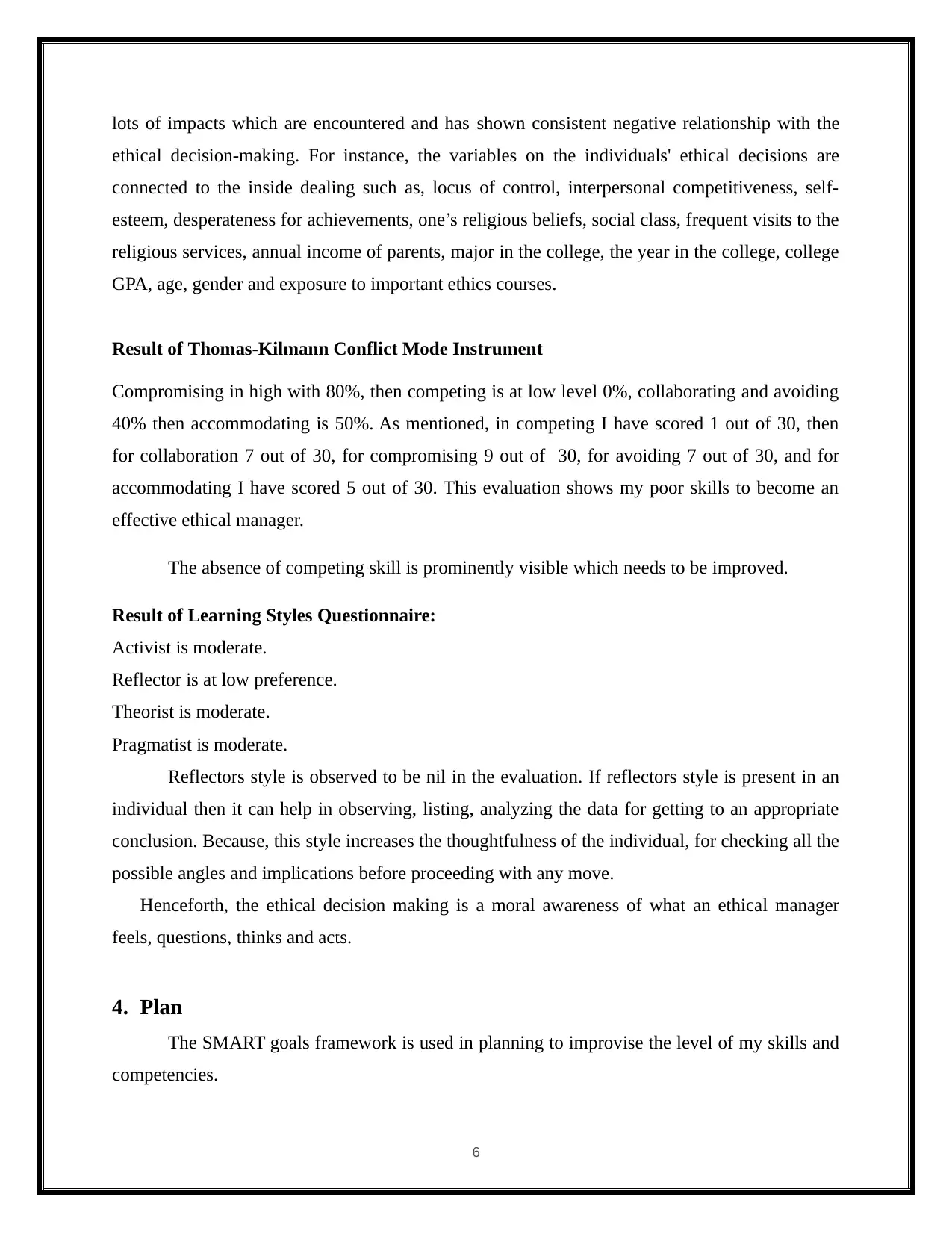
lots of impacts which are encountered and has shown consistent negative relationship with the
ethical decision-making. For instance, the variables on the individuals' ethical decisions are
connected to the inside dealing such as, locus of control, interpersonal competitiveness, self-
esteem, desperateness for achievements, one’s religious beliefs, social class, frequent visits to the
religious services, annual income of parents, major in the college, the year in the college, college
GPA, age, gender and exposure to important ethics courses.
Result of Thomas-Kilmann Conflict Mode Instrument
Compromising in high with 80%, then competing is at low level 0%, collaborating and avoiding
40% then accommodating is 50%. As mentioned, in competing I have scored 1 out of 30, then
for collaboration 7 out of 30, for compromising 9 out of 30, for avoiding 7 out of 30, and for
accommodating I have scored 5 out of 30. This evaluation shows my poor skills to become an
effective ethical manager.
The absence of competing skill is prominently visible which needs to be improved.
Result of Learning Styles Questionnaire:
Activist is moderate.
Reflector is at low preference.
Theorist is moderate.
Pragmatist is moderate.
Reflectors style is observed to be nil in the evaluation. If reflectors style is present in an
individual then it can help in observing, listing, analyzing the data for getting to an appropriate
conclusion. Because, this style increases the thoughtfulness of the individual, for checking all the
possible angles and implications before proceeding with any move.
Henceforth, the ethical decision making is a moral awareness of what an ethical manager
feels, questions, thinks and acts.
4. Plan
The SMART goals framework is used in planning to improvise the level of my skills and
competencies.
6
ethical decision-making. For instance, the variables on the individuals' ethical decisions are
connected to the inside dealing such as, locus of control, interpersonal competitiveness, self-
esteem, desperateness for achievements, one’s religious beliefs, social class, frequent visits to the
religious services, annual income of parents, major in the college, the year in the college, college
GPA, age, gender and exposure to important ethics courses.
Result of Thomas-Kilmann Conflict Mode Instrument
Compromising in high with 80%, then competing is at low level 0%, collaborating and avoiding
40% then accommodating is 50%. As mentioned, in competing I have scored 1 out of 30, then
for collaboration 7 out of 30, for compromising 9 out of 30, for avoiding 7 out of 30, and for
accommodating I have scored 5 out of 30. This evaluation shows my poor skills to become an
effective ethical manager.
The absence of competing skill is prominently visible which needs to be improved.
Result of Learning Styles Questionnaire:
Activist is moderate.
Reflector is at low preference.
Theorist is moderate.
Pragmatist is moderate.
Reflectors style is observed to be nil in the evaluation. If reflectors style is present in an
individual then it can help in observing, listing, analyzing the data for getting to an appropriate
conclusion. Because, this style increases the thoughtfulness of the individual, for checking all the
possible angles and implications before proceeding with any move.
Henceforth, the ethical decision making is a moral awareness of what an ethical manager
feels, questions, thinks and acts.
4. Plan
The SMART goals framework is used in planning to improvise the level of my skills and
competencies.
6
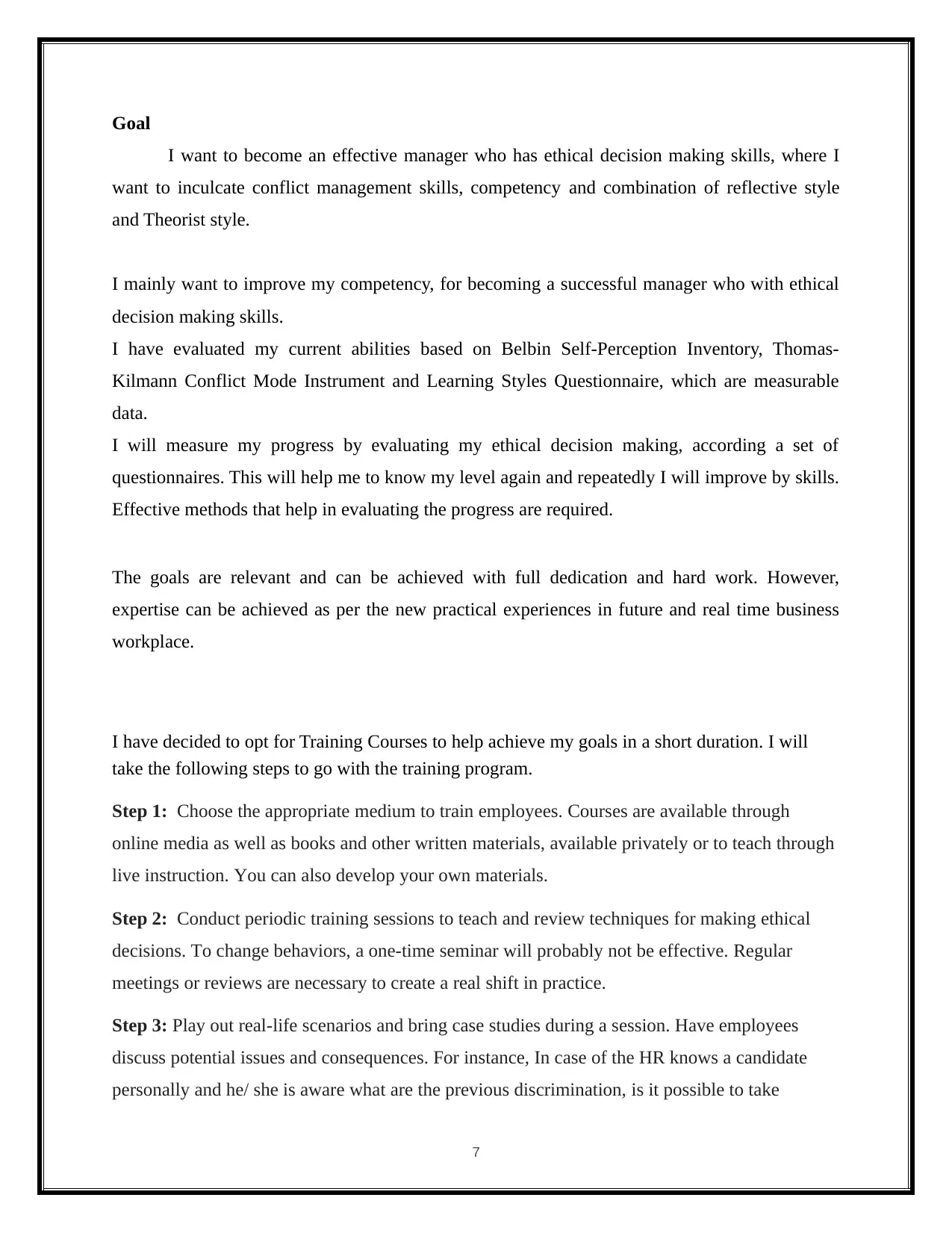
Goal
I want to become an effective manager who has ethical decision making skills, where I
want to inculcate conflict management skills, competency and combination of reflective style
and Theorist style.
I mainly want to improve my competency, for becoming a successful manager who with ethical
decision making skills.
I have evaluated my current abilities based on Belbin Self-Perception Inventory, Thomas-
Kilmann Conflict Mode Instrument and Learning Styles Questionnaire, which are measurable
data.
I will measure my progress by evaluating my ethical decision making, according a set of
questionnaires. This will help me to know my level again and repeatedly I will improve by skills.
Effective methods that help in evaluating the progress are required.
The goals are relevant and can be achieved with full dedication and hard work. However,
expertise can be achieved as per the new practical experiences in future and real time business
workplace.
I have decided to opt for Training Courses to help achieve my goals in a short duration. I will
take the following steps to go with the training program.
Step 1: Choose the appropriate medium to train employees. Courses are available through
online media as well as books and other written materials, available privately or to teach through
live instruction. You can also develop your own materials.
Step 2: Conduct periodic training sessions to teach and review techniques for making ethical
decisions. To change behaviors, a one-time seminar will probably not be effective. Regular
meetings or reviews are necessary to create a real shift in practice.
Step 3: Play out real-life scenarios and bring case studies during a session. Have employees
discuss potential issues and consequences. For instance, In case of the HR knows a candidate
personally and he/ she is aware what are the previous discrimination, is it possible to take
7
I want to become an effective manager who has ethical decision making skills, where I
want to inculcate conflict management skills, competency and combination of reflective style
and Theorist style.
I mainly want to improve my competency, for becoming a successful manager who with ethical
decision making skills.
I have evaluated my current abilities based on Belbin Self-Perception Inventory, Thomas-
Kilmann Conflict Mode Instrument and Learning Styles Questionnaire, which are measurable
data.
I will measure my progress by evaluating my ethical decision making, according a set of
questionnaires. This will help me to know my level again and repeatedly I will improve by skills.
Effective methods that help in evaluating the progress are required.
The goals are relevant and can be achieved with full dedication and hard work. However,
expertise can be achieved as per the new practical experiences in future and real time business
workplace.
I have decided to opt for Training Courses to help achieve my goals in a short duration. I will
take the following steps to go with the training program.
Step 1: Choose the appropriate medium to train employees. Courses are available through
online media as well as books and other written materials, available privately or to teach through
live instruction. You can also develop your own materials.
Step 2: Conduct periodic training sessions to teach and review techniques for making ethical
decisions. To change behaviors, a one-time seminar will probably not be effective. Regular
meetings or reviews are necessary to create a real shift in practice.
Step 3: Play out real-life scenarios and bring case studies during a session. Have employees
discuss potential issues and consequences. For instance, In case of the HR knows a candidate
personally and he/ she is aware what are the previous discrimination, is it possible to take
7
⊘ This is a preview!⊘
Do you want full access?
Subscribe today to unlock all pages.

Trusted by 1+ million students worldwide
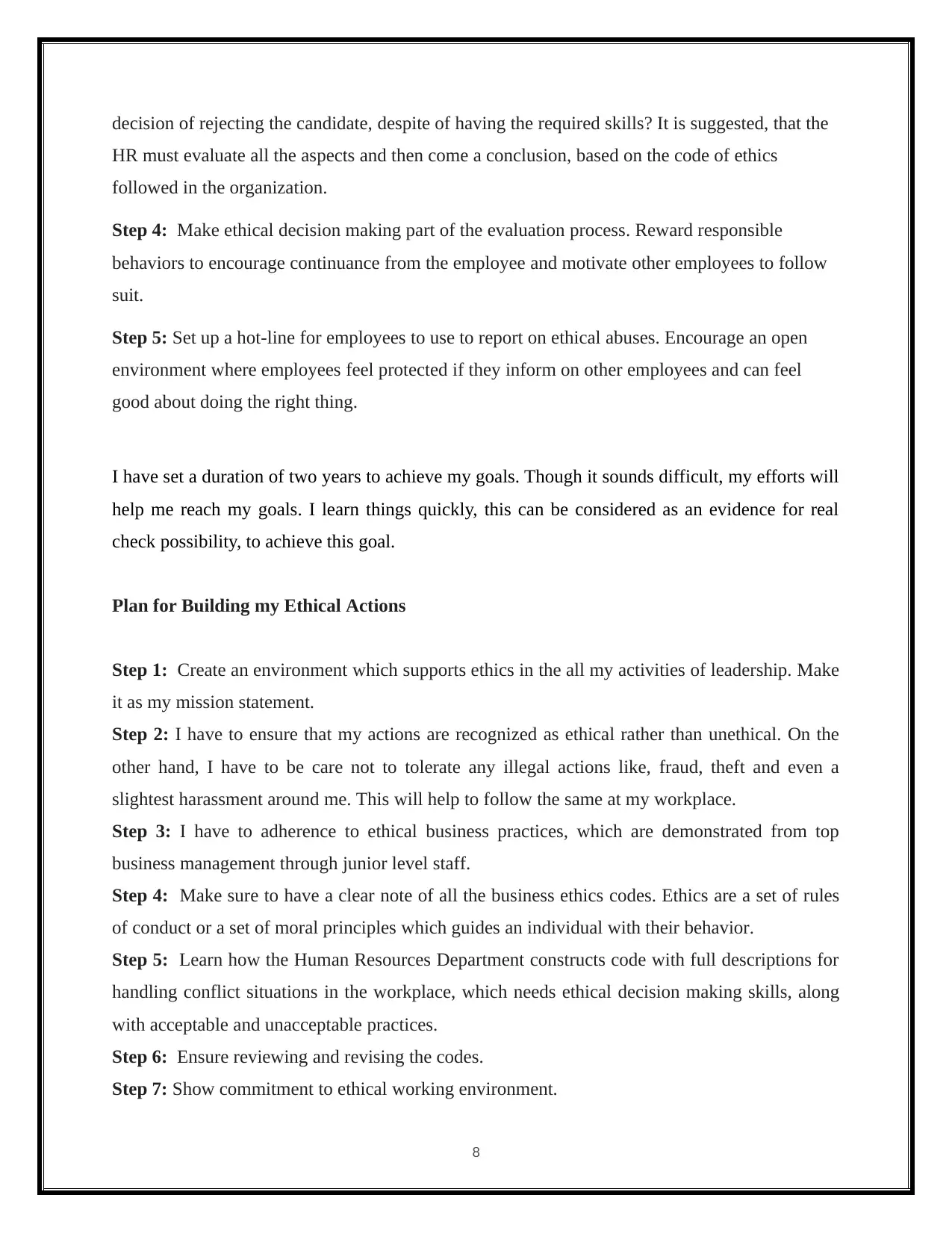
decision of rejecting the candidate, despite of having the required skills? It is suggested, that the
HR must evaluate all the aspects and then come a conclusion, based on the code of ethics
followed in the organization.
Step 4: Make ethical decision making part of the evaluation process. Reward responsible
behaviors to encourage continuance from the employee and motivate other employees to follow
suit.
Step 5: Set up a hot-line for employees to use to report on ethical abuses. Encourage an open
environment where employees feel protected if they inform on other employees and can feel
good about doing the right thing.
I have set a duration of two years to achieve my goals. Though it sounds difficult, my efforts will
help me reach my goals. I learn things quickly, this can be considered as an evidence for real
check possibility, to achieve this goal.
Plan for Building my Ethical Actions
Step 1: Create an environment which supports ethics in the all my activities of leadership. Make
it as my mission statement.
Step 2: I have to ensure that my actions are recognized as ethical rather than unethical. On the
other hand, I have to be care not to tolerate any illegal actions like, fraud, theft and even a
slightest harassment around me. This will help to follow the same at my workplace.
Step 3: I have to adherence to ethical business practices, which are demonstrated from top
business management through junior level staff.
Step 4: Make sure to have a clear note of all the business ethics codes. Ethics are a set of rules
of conduct or a set of moral principles which guides an individual with their behavior.
Step 5: Learn how the Human Resources Department constructs code with full descriptions for
handling conflict situations in the workplace, which needs ethical decision making skills, along
with acceptable and unacceptable practices.
Step 6: Ensure reviewing and revising the codes.
Step 7: Show commitment to ethical working environment.
8
HR must evaluate all the aspects and then come a conclusion, based on the code of ethics
followed in the organization.
Step 4: Make ethical decision making part of the evaluation process. Reward responsible
behaviors to encourage continuance from the employee and motivate other employees to follow
suit.
Step 5: Set up a hot-line for employees to use to report on ethical abuses. Encourage an open
environment where employees feel protected if they inform on other employees and can feel
good about doing the right thing.
I have set a duration of two years to achieve my goals. Though it sounds difficult, my efforts will
help me reach my goals. I learn things quickly, this can be considered as an evidence for real
check possibility, to achieve this goal.
Plan for Building my Ethical Actions
Step 1: Create an environment which supports ethics in the all my activities of leadership. Make
it as my mission statement.
Step 2: I have to ensure that my actions are recognized as ethical rather than unethical. On the
other hand, I have to be care not to tolerate any illegal actions like, fraud, theft and even a
slightest harassment around me. This will help to follow the same at my workplace.
Step 3: I have to adherence to ethical business practices, which are demonstrated from top
business management through junior level staff.
Step 4: Make sure to have a clear note of all the business ethics codes. Ethics are a set of rules
of conduct or a set of moral principles which guides an individual with their behavior.
Step 5: Learn how the Human Resources Department constructs code with full descriptions for
handling conflict situations in the workplace, which needs ethical decision making skills, along
with acceptable and unacceptable practices.
Step 6: Ensure reviewing and revising the codes.
Step 7: Show commitment to ethical working environment.
8
Paraphrase This Document
Need a fresh take? Get an instant paraphrase of this document with our AI Paraphraser
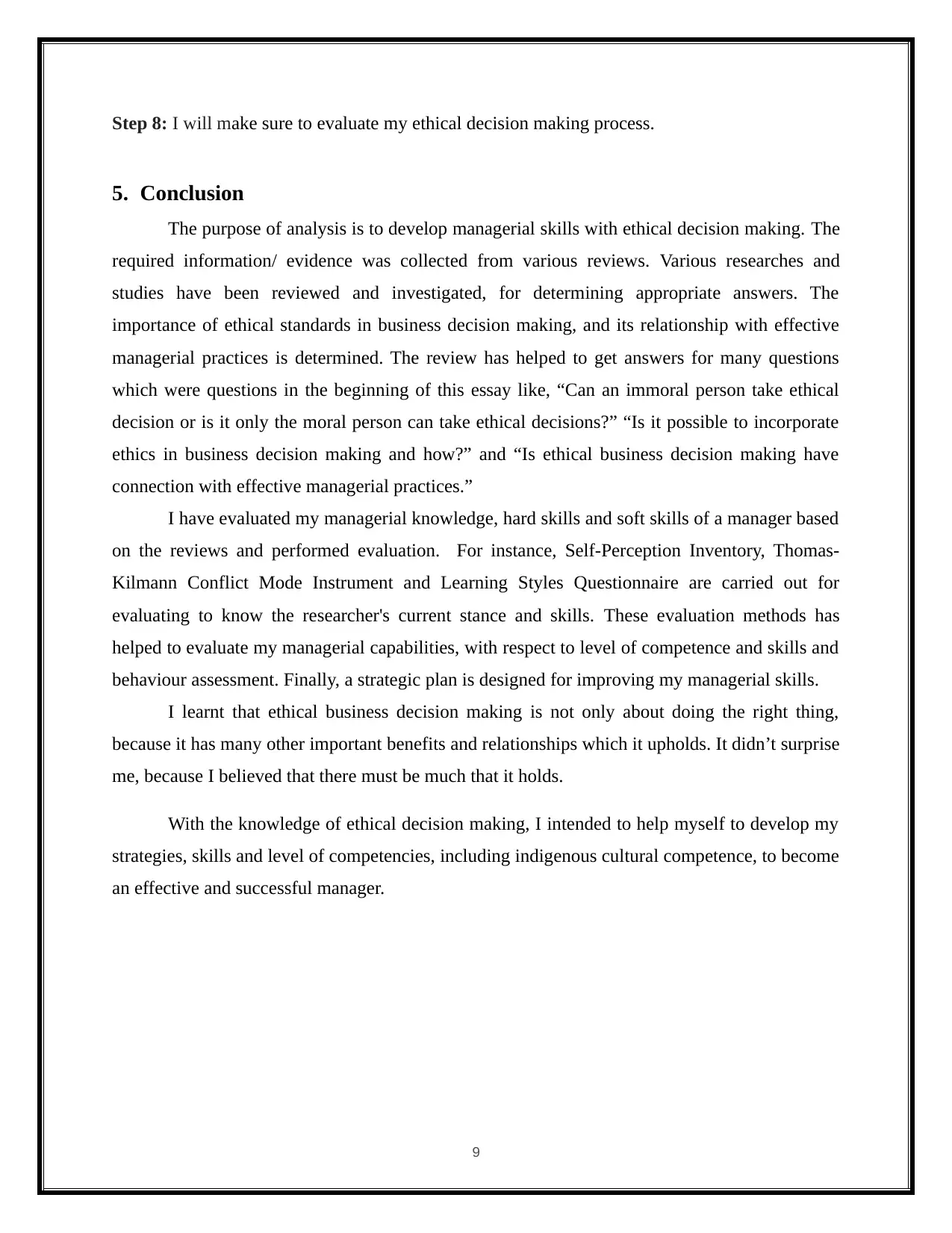
Step 8: I will make sure to evaluate my ethical decision making process.
5. Conclusion
The purpose of analysis is to develop managerial skills with ethical decision making. The
required information/ evidence was collected from various reviews. Various researches and
studies have been reviewed and investigated, for determining appropriate answers. The
importance of ethical standards in business decision making, and its relationship with effective
managerial practices is determined. The review has helped to get answers for many questions
which were questions in the beginning of this essay like, “Can an immoral person take ethical
decision or is it only the moral person can take ethical decisions?” “Is it possible to incorporate
ethics in business decision making and how?” and “Is ethical business decision making have
connection with effective managerial practices.”
I have evaluated my managerial knowledge, hard skills and soft skills of a manager based
on the reviews and performed evaluation. For instance, Self-Perception Inventory, Thomas-
Kilmann Conflict Mode Instrument and Learning Styles Questionnaire are carried out for
evaluating to know the researcher's current stance and skills. These evaluation methods has
helped to evaluate my managerial capabilities, with respect to level of competence and skills and
behaviour assessment. Finally, a strategic plan is designed for improving my managerial skills.
I learnt that ethical business decision making is not only about doing the right thing,
because it has many other important benefits and relationships which it upholds. It didn’t surprise
me, because I believed that there must be much that it holds.
With the knowledge of ethical decision making, I intended to help myself to develop my
strategies, skills and level of competencies, including indigenous cultural competence, to become
an effective and successful manager.
9
5. Conclusion
The purpose of analysis is to develop managerial skills with ethical decision making. The
required information/ evidence was collected from various reviews. Various researches and
studies have been reviewed and investigated, for determining appropriate answers. The
importance of ethical standards in business decision making, and its relationship with effective
managerial practices is determined. The review has helped to get answers for many questions
which were questions in the beginning of this essay like, “Can an immoral person take ethical
decision or is it only the moral person can take ethical decisions?” “Is it possible to incorporate
ethics in business decision making and how?” and “Is ethical business decision making have
connection with effective managerial practices.”
I have evaluated my managerial knowledge, hard skills and soft skills of a manager based
on the reviews and performed evaluation. For instance, Self-Perception Inventory, Thomas-
Kilmann Conflict Mode Instrument and Learning Styles Questionnaire are carried out for
evaluating to know the researcher's current stance and skills. These evaluation methods has
helped to evaluate my managerial capabilities, with respect to level of competence and skills and
behaviour assessment. Finally, a strategic plan is designed for improving my managerial skills.
I learnt that ethical business decision making is not only about doing the right thing,
because it has many other important benefits and relationships which it upholds. It didn’t surprise
me, because I believed that there must be much that it holds.
With the knowledge of ethical decision making, I intended to help myself to develop my
strategies, skills and level of competencies, including indigenous cultural competence, to become
an effective and successful manager.
9
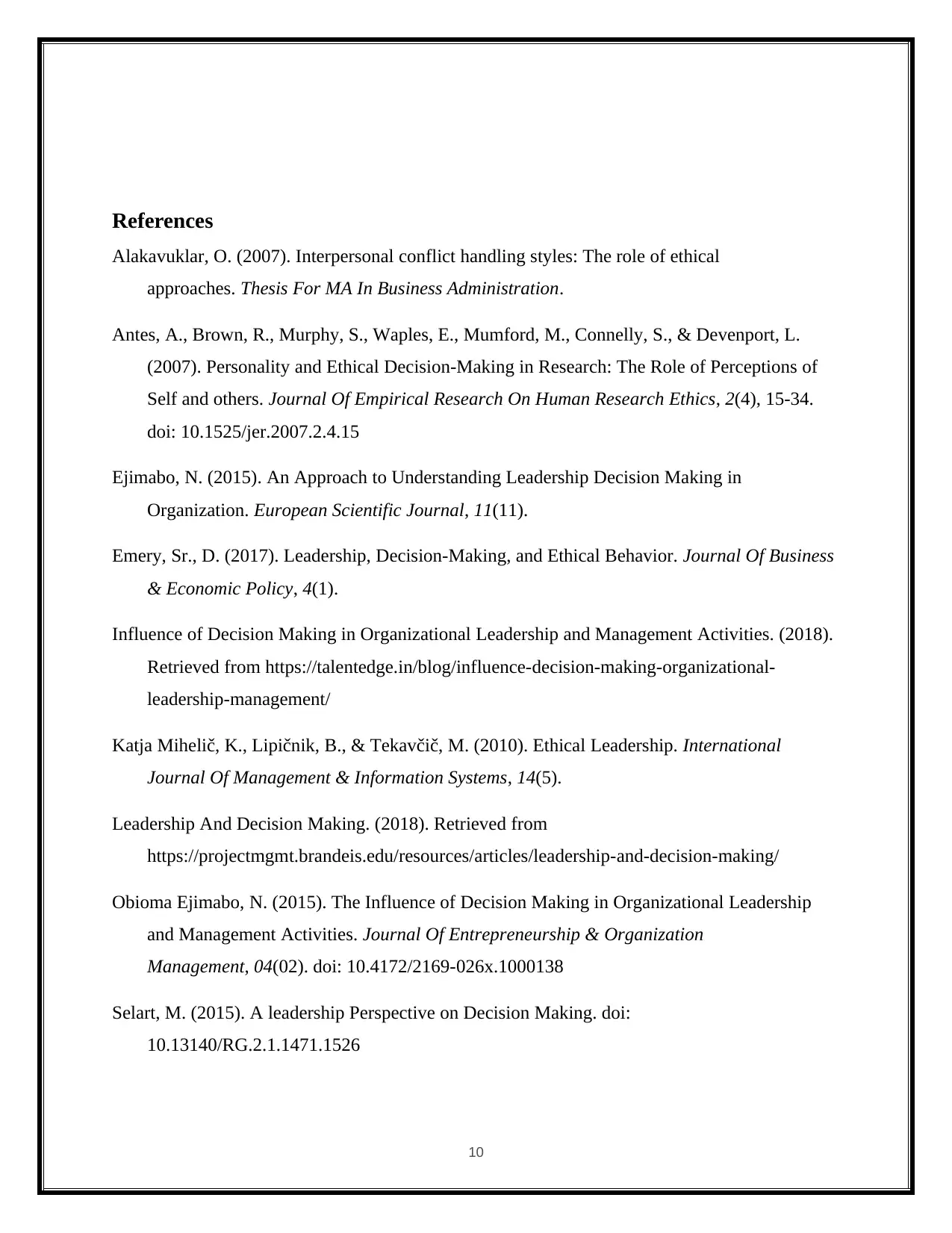
References
Alakavuklar, O. (2007). Interpersonal conflict handling styles: The role of ethical
approaches. Thesis For MA In Business Administration.
Antes, A., Brown, R., Murphy, S., Waples, E., Mumford, M., Connelly, S., & Devenport, L.
(2007). Personality and Ethical Decision-Making in Research: The Role of Perceptions of
Self and others. Journal Of Empirical Research On Human Research Ethics, 2(4), 15-34.
doi: 10.1525/jer.2007.2.4.15
Ejimabo, N. (2015). An Approach to Understanding Leadership Decision Making in
Organization. European Scientific Journal, 11(11).
Emery, Sr., D. (2017). Leadership, Decision-Making, and Ethical Behavior. Journal Of Business
& Economic Policy, 4(1).
Influence of Decision Making in Organizational Leadership and Management Activities. (2018).
Retrieved from https://talentedge.in/blog/influence-decision-making-organizational-
leadership-management/
Katja Mihelič, K., Lipičnik, B., & Tekavčič, M. (2010). Ethical Leadership. International
Journal Of Management & Information Systems, 14(5).
Leadership And Decision Making. (2018). Retrieved from
https://projectmgmt.brandeis.edu/resources/articles/leadership-and-decision-making/
Obioma Ejimabo, N. (2015). The Influence of Decision Making in Organizational Leadership
and Management Activities. Journal Of Entrepreneurship & Organization
Management, 04(02). doi: 10.4172/2169-026x.1000138
Selart, M. (2015). A leadership Perspective on Decision Making. doi:
10.13140/RG.2.1.1471.1526
10
Alakavuklar, O. (2007). Interpersonal conflict handling styles: The role of ethical
approaches. Thesis For MA In Business Administration.
Antes, A., Brown, R., Murphy, S., Waples, E., Mumford, M., Connelly, S., & Devenport, L.
(2007). Personality and Ethical Decision-Making in Research: The Role of Perceptions of
Self and others. Journal Of Empirical Research On Human Research Ethics, 2(4), 15-34.
doi: 10.1525/jer.2007.2.4.15
Ejimabo, N. (2015). An Approach to Understanding Leadership Decision Making in
Organization. European Scientific Journal, 11(11).
Emery, Sr., D. (2017). Leadership, Decision-Making, and Ethical Behavior. Journal Of Business
& Economic Policy, 4(1).
Influence of Decision Making in Organizational Leadership and Management Activities. (2018).
Retrieved from https://talentedge.in/blog/influence-decision-making-organizational-
leadership-management/
Katja Mihelič, K., Lipičnik, B., & Tekavčič, M. (2010). Ethical Leadership. International
Journal Of Management & Information Systems, 14(5).
Leadership And Decision Making. (2018). Retrieved from
https://projectmgmt.brandeis.edu/resources/articles/leadership-and-decision-making/
Obioma Ejimabo, N. (2015). The Influence of Decision Making in Organizational Leadership
and Management Activities. Journal Of Entrepreneurship & Organization
Management, 04(02). doi: 10.4172/2169-026x.1000138
Selart, M. (2015). A leadership Perspective on Decision Making. doi:
10.13140/RG.2.1.1471.1526
10
⊘ This is a preview!⊘
Do you want full access?
Subscribe today to unlock all pages.

Trusted by 1+ million students worldwide
1 out of 25
Related Documents
Your All-in-One AI-Powered Toolkit for Academic Success.
+13062052269
info@desklib.com
Available 24*7 on WhatsApp / Email
![[object Object]](/_next/static/media/star-bottom.7253800d.svg)
Unlock your academic potential
Copyright © 2020–2026 A2Z Services. All Rights Reserved. Developed and managed by ZUCOL.





